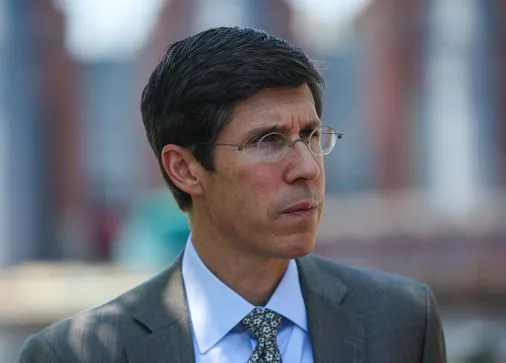
PROVIDENCE — Mayor Brett Smiley will continue with his predecessor’s plans to devote $10 million to “reparations” in the city of Providence, announcing Thursday a new plan to shift more of the unspent money to the United Way of Rhode Island to manage.
Former Mayor Jorge Elorza had launched a years-long process to have municipal reparations while he was in office, eventually allocating $10 million worth of American Rescue Plan Act funds for the program, which was approved by the Providence City Council last year.
Elorza’s program did not include any direct payments to Providence residents, and eligibility is not limited by race, though the initiatives are aimed at benefitting the Black and Indigenous communities.
Only $273,430 — less than 3 percent — of the $10 million has been spent so far.
Smiley, who took office in January, had said he would pause and review Elorza’s planned initiatives and determine whether to move forward. He has decided to continue the reparations program — which is officially called the COVID-19 equities fund — while also shifting more of the money to the United Way.
The mayor is proposing to give $3.35 million to the United Way, which will create a policy and research center, develop nonprofit capacity, and issue grants to nonprofits “intended to help close the racial wealth gap, address the impacts of urban renewal, and advance education-related deliverables,” according to a news release.
The original plan was to give $1.75 million to the United Way. Cortney Nicolato, the president and CEO, said the organization has not yet received any of that money from the city.
The new proposal will be considered by the Providence Board of Contract and Supply on Monday. According to materials submitted to the board, about $650,000 of the United Way’s allocation would go toward salaries and benefits and $300,000 to administrative expenses, with the rest being allocated to subcontractors in the program.
The United Way initiatives include creating a K-12 “matter of truth” curriculum about the history of systemic racism in Rhode Island. Another initiative would collaborate on programming with local barbershops.
The initiatives would run from Dec. 1 of this year to June 30, 2026.
“I think it’s great the city of Providence is earmarking dollars towards really fueling programs that can build racial equity in our communities,” Nicolato told the Globe. “Our hope is that these dollars go out quick, that they go out with the community engaged, and that we measure the impact of the success of it as part of the process.”
The rest of the $10 million — a balance of about $6.3 million — will be administered by the city. It’s unclear when exactly the money will go out, but federal law requires ARPA money to be obligated by the end of next year and fully spent by the end of 2026.
The actual line items in the reparations program have not changed from what was approved under the Elorza administration following months of discussions by a special municipal reparations commission. They include homeownership education, small business acceleration and financial literacy programs.
Providence residents eligible for the program include Black and Indigenous people, people living in certain neighborhoods known as qualified census tracts, and people living in poverty, regardless of race or ethnicity. The Elorza administration had said despite calling the program “reparations,” the city could not legally limit the use of taxpayer funds only to people of color.
The $273,430 spent so far has gone to the Rhode Island Black Business Association, Inspiring Minds, Interlace Grant Fund, and SEIU education and support funding, according to Patricia Socarras, the mayor’s communications director.
Under the previous administration, city officials had said the $10 million in federal taxpayer funds for reparations represented “seed money” that could be supplemented by private donations in the future. Nicolato said the United Way would continue raising money for the cause, but not necessarily for Providence’s COVID-19 equities fund.
“That is work we already do,” Nicolato said. “We are already raising money for improving racial equity.”
“I am incredibly excited to partner with United Way of Rhode Island to advance the many programs included in the COVID-19 Equities Program,” Smiley said in a statement. “United Way is a trusted community partner taking meaningful steps to close local equity gaps.”
Steph Machado can be reached at steph.machado@globe.com. Follow her @StephMachado.


